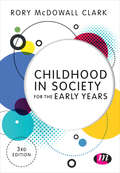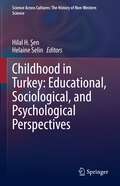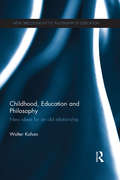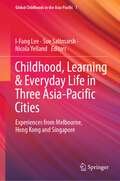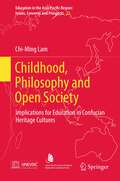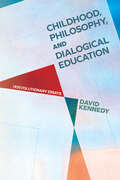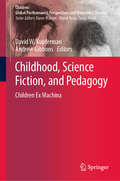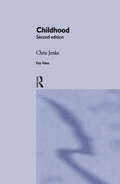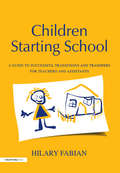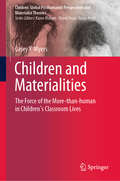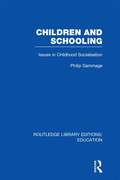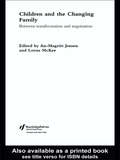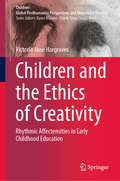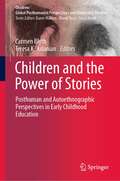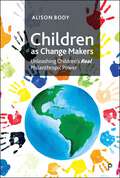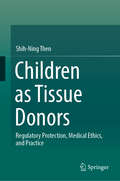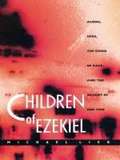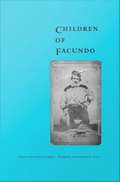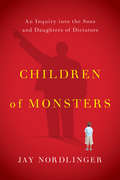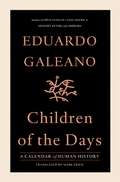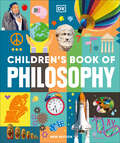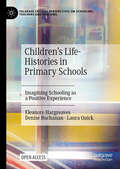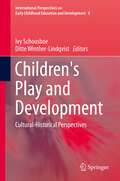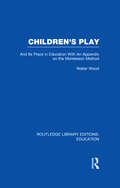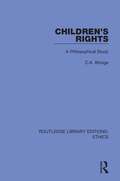- Table View
- List View
Childhood in Society for the Early Years
by Rory ClarkChildhood can only be understood in relation to the multitude of social factors which surround it. Written for students of degrees and foundation degrees in Early Years, Early Childhood Studies and related disciplines, this accessible text offers an introduction to the study of these complex issues including the different contexts within which childhood exists. These contexts, from the child within the family, to the global perspective and the child's own perspective are closely examined. This second edition is updated in line with recent changes to early years policy and includes a new chapter 'The context of partnership: children in transition'. About the Early Years Series This series has been designed to support students of Early Years, Early Childhood Studies and related disciplines in popular modules of their course. Each text takes a focused look at a specific topic and approaches it in an accessible and user-friendly way. Features have been developed to help readers engage with the text and understand the subject from a number of different viewpoints. Activities pose questions to prompt thought and discussion and 'Theory Focus' boxes examine essential theory close-up for better understanding. This series is also applicable to EYPS candidates on all pathways. Other titles in the series are Early Childhood Studies, Becoming a Practitioner in the Early Years, Child Observation for the Early Years and Exploring Play for Early Childhood Studies. Rory McDowall Clark originally trained as a nursery and primary teacher in Brighton and has a wide range of experience in broader social contexts including community development with charities, voluntary organisations and outreach youth work. Rory is a senior lecturer in the Centre for Early Childhood at the University of Worcester.
Childhood in Turkey: Educational, Sociological, and Psychological Perspectives (Science Across Cultures: The History of Non-Western Science #11)
by Helaine Selin Hilal H. ŞenThis volume asks, what is it like to be a child in a country where 25% of the population is under the age of 14? Handling this question through a multidisciplinary lens, the book provides a rich and diverse analysis of different portrayals of childhood in Turkey. From children’s rights to transformation of childhood, from refugee children to host country children living in armed conflict areas, from cultural factors to gene-environment interaction, from parent-focused to child-focused programs, readers will find in-depth and up-to-date information about children living in Turkey from the perspectives of sociology, education, and psychology sciences.
Childhood, Education and Philosophy: New ideas for an old relationship (New Directions in the Philosophy of Education)
by Walter KohanThis book explores the idea of a childlike education and offers critical tools to question traditional forms of education, and alternative ways to understand and practice the relationship between education and childhood. Engaging with the work of Michel Foucault, Jacques Rancière, Giorgio Agamben and Simón Rodríguez, it contributes to the development of a philosophical framework for the pedagogical idea at the core of the book, that of a childlike education. Divided into two parts, the book introduces innovative ideas through philosophical argument and discussion, challenging existing understandings of what it means to teach or to form a child, and putting into question the idea of education as a process of formation. The first part of the book consists of a dialogue with a number of interlocutors in order to develop an original conception of education. The second part presents the idea of a childlike education, beginning with a discussion of the relationships between childhood and philosophy, and followed by a critique of the place of philosophical experience in a childhood of education. Instead of asking how philosophy might educate childhood, this book raises the question of how childhood might educate philosophy. It will be of key value to researchers, educators and postgraduate students in the fields of education and the human sciences.
Childhood, Learning & Everyday Life in Three Asia-Pacific Cities: Experiences from Melbourne, Hong Kong and Singapore (Global Childhoods in the Asia-Pacific #1)
by Nicola Yelland Sue Saltmarsh I-Fang LeeThis book introduces findings from an international, cross-cultural, and interdisciplinary study of children’s everyday experiences of growing up and going to school in the context of the three global cities of Hong Kong, Singapore and Melbourne. It takes the premise that children’s learning and orientations to educational success are shaped by everyday cultural practices at home and at school, by policy contexts that both produce and respond to educational and cultural norms, and by individual and familial desires and aspirations. Drawing on research conducted with primary school-aged children in Year 4, the book considers how day-to-day routines such as going to school, engaging in extra-curricular activities outside of school, and spending time at home with family intersect with the broader milieus of education policy ideals in a changing and interconnected world. Through a combination of visual methodologies, surveys, ethnographic observations in schools, classrooms and cityscapes, re-enactments of everyday activities with children at home, and sociological education policy analysis, this book shows both the richness of children’s everyday lives and learning in global cities, as well as exploring questions that pose challenges to educational and social norms.
Childhood, Philosophy and Open Society: Implications for Education in Confucian Heritage Cultures (Education in the Asia-Pacific Region: Issues, Concerns and Prospects #22)
by Chi-Ming LamThe purpose of this book is to develop a theory and practice of education from Karl Popper's non-justificationist philosophy for promoting an open society. Specifically, the book is designed to develop an educational programme for fostering critical thinking in children, particularly when they are involved in group discussion.The study conducted an experiment to assess the effectiveness of Matthew Lipman's Philosophy for Children (P4C) programme in promoting Hong Long (Chinese) children's critical thinking. Forty-two Secondary 1 students volunteered for the experiment, from whom 28 students were randomly selected and randomly assigned to two groups of 14 each: one receiving P4C lessons and the other receiving English lessons. The students who were taught P4C were found to perform better in the reasoning test than those who were not, to be capable of discussing philosophical problems in a competent way, and to have a very positive attitude towards doing philosophy in the classroom. It was also found that P4C played a major role in developing the students' critical thinking.Considering that the construction of children by adults as incompetent in the sense of lacking reason, maturity, or independence reinforces the traditional structure of adult authority over children in society, it runs counter to the goal of fostering critical thinking in children. As a way to return justice to childhood and to effectively promote critical thinking in children, the present study suggested reconstructing the concept of childhood, highlighting the importance of establishing a coherent public policy on promotion of agency in children and also the importance of empowering them to participate actively in research, legal, and educational institutions.
Childhood, Philosophy, and Dialogical Education: (R)evolutionary Essays (SUNY series, Horizons in the Philosophy of Education)
by David KennedyChildhood, Philosophy, and Dialogical Educationn explores the history and prospects of democratic, dialogical education, and its promise as an engine of social and cultural evolution, especially in the context of the cultural and social site dedicated to the adult-child encounter: the school. Drawing on three historical narratives—of childhood, of subjectivity (psychohistory), and of education—the author offers the possibility of a form of schooling that fosters democratic sensibilities and teaches direct democracy through actual practice.
Childhood, Science Fiction, and Pedagogy: Children Ex Machina (Children: Global Posthumanist Perspectives and Materialist Theories)
by David W. Kupferman Andrew GibbonsThis book invites readers to both reassess and reconceptualize definitions of childhood and pedagogy by imagining the possibilities - past, present, and future - provided by the aesthetic turn to science fiction. It explores constructions of children, childhood, and pedagogy through the multiple lenses of science fiction as a method of inquiry, and discusses what counts as science fiction and why science fiction counts. The book examines the notion of relationships in a variety of genres and stories; probes affect in the convergence of childhood and science fiction; and focuses on questions of pedagogy and the ways that science fiction can reflect the status quo of schooling theory, practice, and policy as well as offer alternative educative possibilities. Additionally, the volume explores connections between children and childhood studies, pedagogy and posthumanism. The various contributors use science fiction as the frame of reference through which conceptual links between inquiry and narrative, grounded in theories of media studies, can be developed.
Childhood: Second edition (Key Ideas #10)
by Chris JenksIn this book Chris Jenks looks at what the ways in which we construct our image of childhood can tell us about ourselves. After a general discussion of the social construction of childhood, the book is structured around three examples of the way the image of the child is played out in society: the history of childhood from medieval times through the enlightenment 'discovery' of childhood to the present the mythology and reality of child abuse and society's response to it the 'death' of childhood in cases such as the James Bulger murder in which the child itself becomes the perpetrator of evil. Part of the highly successful Key Ideas series, this book gives students a concise, provocative insight into some of the controlling concepts of our culture.
Children Starting School: A Guide to Successful Transitions and Transfers for Teachers and Assistants
by Hilary FabianDrawing on research, theory and practice, this book presents ways in which practitioners, working in partnership with parents, can give children a successful start to school. Written in an accessible style, the book helps early years practitioners planning transition programs for new children and offers ideas for developing their professional practice when working with families. Starting school at the age of four or five is recognized as a major adjustment in a child's life that can determine his or her future success in education. This book highlights the factors that influence children's early adjustment, including their social and emotional wellbeing, so that schools can learn the best way to offer support. Practitioners, managers and those studying on early childhood courses will gain an understanding of the complexity and diversity of transition and will learn how they can make this a stress-free time for the children, families and professionals involved.
Children and Materialities: The Force of the More-than-human in Children’s Classroom Lives (Children: Global Posthumanist Perspectives and Materialist Theories)
by Casey Y. MyersThis book makes the case for young children as both keenly materially aware of and highly dependent on sets of interrelated material-discursive circumstances. It argues that long-term engagement with children around the topic of meaning-matter relations upends many taken-for-granted notions of consumption, self-regulation, knowledge production, and what constitutes quality of life within a school setting.The book provides complex accounts of agency on multiple scales - the capability of children to shape and share research, the force of objects, stuff, and things to impact the "social" workings of a classroom, and the impact of nonhuman animals on the trajectory of the ways in which children relate to each other.This work makes a significant contribution to both theoretical conceptions and practical enactments of childhoods, productively addressing the many contradictions inherent in a posthuman and participatory approach to researching with young children. It also offers insights into how the everyday materialities of children’s classrooms (and their complex representations) are capable of disrupting the common-sense order of things.
Children and Schooling: Issues In Childhood Socialization (Routledge Library Editions: Education)
by Phillip GammageThe book provides a synthesis of a broadly-based social-psychology of education and bridges the gap between theory and practice in education by emphasising the relationship between research and actuality. The author discusses the major issues in childhood socialisation relating to schooling, achievement and the curriculum, and in so doing makes a sensitive and well-argued case for the social-psychological perspective.He presents a social-psychologist’s view of the interaction between child, school and curriculum, and summarises mainstream psychological contributions to current thinking on achievement, self-esteem and education. He covers areas of social learning and attribution theory not commonly dealt with in education texts, showing that there are major fields of research which have until now been neglected. Children and Schooling is constructed so that its chapters can be used as independent study-guides to specific subjects or read in sequence, each subject inter-related. The text can be treated as an introduction, particularly in view of the notes and comprehensive and apposite scholarly apparatus: and as a spring-board for serious study at advanced level.
Children and the Changing Family: Between Transformation and Negotiation
by An-Magritt JensenThis timely and thought-provoking book explores how social and family change are colouring the experience of childhood. The book is centred around three major changes: parental employment, family composition and ideology. The authors demonstrate how children's families are transformed in accordance with societal changes in demographic and economic terms, and as a result of the choices parents make in response to these changes. Despite claims that society is becoming increasingly child-centred, this book argues that children still have little influence over the major changes in their lives.This book breaks new ground by researching family change from the child's point of view. Through combinations from childhood experts in Scandinavia, the UK and America, the book shows the importance of studying children's lives in families in order to understand how far children are active agents in contemporary society.Students of childhood studies, sociology, social work and education will find this book essential reading. It will also be of interest to practitioners in the social, child and youth services.
Children and the Ethics of Creativity: Rhythmic Affectensities in Early Childhood Education (Children: Global Posthumanist Perspectives and Materialist Theories)
by Victoria Jane HargravesThis book presents a critical reimagining of education and educational research in addressing practices of representation and their relation to epistemology, subjectivity and ontology in the context of early childhood education. Drawing on posthumanist perspectives and the immanent materialism of Deleuze & Guattari to conceive of early childhood education, childhood and indeed, adult life, in new ways, it highlights the powerful role of language in subjectivity and ontology, and introduces affectensity as a concept which can be put to work to undo habitual relations and meanings. It proposes that ethical becomings require the engagement of an expansion and intensification of a body’s affect or capacity, and offers readers a provocation for enhancing creative capacity as an ethic. This book is an important contribution to the discussions on methods for living and of ways of thinking commensurate with the orientation of a posthuman turn.
Children and the Power of Stories: Posthuman and Autoethnographic Perspectives in Early Childhood Education (Children: Global Posthumanist Perspectives and Materialist Theories)
by Carmen Blyth Teresa K. AslanianThis book explores how stretching stories through posthuman and autoethnographic perspectives can produce new stories that decolon(ial)ize traditional thinking and approaches to Early Childhood Education (ECE). It demonstrates how stories can provide a different way of knowing, and a way of knowing differently: a way of decolon(ial)izing current discourses of early childhood education within educational institutions.The book uses research and practice in ECE to act as a canvas, a context with which to explore how autoethnography can become other when viewed through a posthumanist lens. As a consequence the chapters and stories within allow for an interplay between the posthumanist and the autoethnographic, an interplay that allows for a very specific type of meaning to emerge; a meaning that traffics in numerous and disruptive possibilities rather than settled certainties. In so doing, authors rethink and perturb the notion of child-centered approaches to knowing, be(com)ing, and doing within the Early Childhood Education context.
Children as Change Makers: Unleashing Children’s Real Philanthropic Power
by Alison BodyHow can we help children make a difference, allowing them to shape their communities, locally and globally? Drawing on a rich blend of academic research and case studies, Alison Body critically examines societal structures, including education, communities and cultural narratives, that shape children's understanding of active, philanthropic citizenship. Children as Change-Makers calls for a reimagining of philanthropy as a form of participatory citizenship, advocating for a philanthropic ecosystem framed by justice, solidarity and collective action. It serves as a roadmap for all stakeholders – from individuals to institutions – to empower children as agents of positive social change, fostering a more just world for generations to come.
Children as Tissue Donors: Regulatory Protection, Medical Ethics, And Practice
by Shih-Ning ThenThis book examines the position of children who provide tissue to potentially save the life of another. It questions whether child donors of all ages have been treated appropriately and whether they are sufficiently protected in acting as tissue donors, and ultimately considers whether a new regulatory response is needed to benefit donor children.The book couples a legal exposition of the donor child’s position with the medico-ethical reality of clinical practice. In recent years, a growing body of literature concerning the clinical experiences and outcomes for child donors has emerged. This book adds to this by examining another dimension – the regulatory frameworks at play. It examines the ethical arguments for and against children acting as tissue donors and provides an original analysis of the legal and non-legal regulatory frameworks governing children’s participation in the United Kingdom, United States and Australia. It combines these doctrinal and theoretical approaches with insights into clinical practice gained from the results of qualitative research conducted with health professionals.The analysis inevitably explores the more general issues of children’s right to make medical decisions, the role of parents in decision-making, the value of the best interests test and alternative (legal and ethical) standards, rights of participation of children before the courts, and the role of law and other forms of regulation in a clinical context.
Children of Ezekiel: Aliens, UFOs, the Crisis of Race, and the Advent of End Time
by Michael LiebAre Milton's Paradise Lost, Ronald Reagan's "Star Wars" missile defense program, our culture's fascination with UFOs and alien abductions, and Louis Farrakhan's views on racial Armageddon somehow linked? In Children of Ezekiel Michael Lieb reveals the connections between these phenomena and the way culture has persistently related the divine to the technological. In a work of special interest at the approach of the millennium, Lieb traces these and other diverse cultural moments--all descended from the prophet Ezekiel's vision of a fiery divine chariot in the sky--from antiquity to the present, across high and low culture, to reveal the pervasive impact of this visionary experience on the modern world. Beginning with the merkabah chariot literature of Hebrew and Gnostic mysticism, Lieb shows how religiously inspired people concerned with annihilating their heretical enemies seized on Ezekiel's vision as revealing the technologically superior instrument of God's righteous anger. He describes how many who seek to know the unknowable that is the power of God conceive it in technological terms--and how that power is associated with political aims and a heralding of the end of time. For Milton, Ezekiel's chariot becomes the vehicle in which the Son of God does battle with the rebellious angels. In the modern age, it may take the form of a locomotive, tank, airplane, missile, or UFO. Technology itself is seen as a divine gift and an embodiment of God in the temporal world. As Lieb demonstrates, the impetus to produce modern technology arises not merely from the desire for profit or military might but also from religious-spiritual motives. Including discussions of conservative evangelical Christian movements, Reagan's ballistic shooting gallery in the sky, and the Nation of Islam's vision of the "mother plane" as the vehicle of retribution in the war against racial oppression, Children of Ezekiel will enthrall readers who have been captivated, either through religious belief or intellectual interests, by a common thread uniting millennial religious beliefs, racial conflict, and political and militaristic aspirations.
Children of Facundo
by Ariel de la FuenteIn Children of Facundo Ariel de la Fuente examines postindependence Argentinian instability and political struggle from the perspective of the rural lower classes. As the first comprehensive regional study to explore nineteenth-century society, culture, and politics in the Argentine interior--where more than 50 percent of the population lived at the time--the book departs from the predominant Buenos Aires-centered historiography to analyze this crucial period in the processes of state- and nation-building. La Rioja, a province in the northwest section of the country, was the land of the caudillos immortalized by Domingo F. Sarmiento, particularly in his foundational and controversial book Facundo. De la Fuente focuses on the repeated rebellions in this district during the 1860s, when Federalist caudillos and their followers, the gauchos, rose up against the new Unitarian government. In this social and cultural analysis, de la Fuente argues that the conflict was not a factional struggle between two ideologically identical sectors of the elite, as commonly depicted. Instead, he believes, the struggle should be seen from the perspective of the lower-class gauchos, for whom Unitarianism and Federalism were highly differentiated party identities that represented different experiences during the nineteenth century. To reconstruct this rural political culture de la Fuente relies on sources that heretofore have been little used in the study of nineteenth-century Latin American politics, most notably a rich folklore collection of popular political songs, folktales, testimonies, and superstitions passed down by old gauchos who had been witnesses or protagonists of the rebellions. Criminal trial records, private diaries, and land censuses add to the originality of de la Fuente's study, while also providing a new perspective on Sarmiento's works, including the classic Facundo. This book will interest those specializing in Latin American history, literature, politics, and rural issues.
Children of Monsters
by Jay NordlingerWhat’s it like to be the son or daughter of a dictator? A monster on the Stalin level? What’s it like to bear a name synonymous with oppression, terror, and evil? Jay Nordlinger set out to answer that question, and does so in this book. He surveys 20 dictators in all. They are the worst of the worst: Stalin, Mao, Idi Amin, Pol Pot, Saddam Hussein, and so on. The book is not about them, really, though of course they figure in it. It’s about their children. Some of them are absolute loyalists. They admire, revere, or worship their father. Some of them actually succeed their father as dictator--as in North Korea, Syria, and Haiti. Some of them have doubts. A couple of them become full-blown dissenters, even defectors. A few of the daughters have the experience of having their husband killed by their father. Most of these children are rocked by war, prison, exile, or other upheaval. Obviously, the children have things in common. But they are also individuals, making of life what they can. The main thing they have in common is this: They have been dealt a very, very unusual hand. What wouldyou do, if you were the offspring of an infamous dictator, who lords it over your country? An early reader of this book said, "There’s an opera on every page”: a drama, a tragedy (or even a comedy). Another reader said he had read the chapter on Bokassa "with my eyes on stalks. ” Meet these characters for yourself. Marvel, shudder, and ponder.
Children of the Days: A Calendar of Human History
by Eduardo GaleanoSelected by Guernica magazine as an "Editors' Picks: Best of 2013"Unfurling like a medieval book of days, each page of Eduardo Galeano's Children of the Days has an illuminating story that takes inspiration from that date of the calendar year, resurrecting the heroes and heroines who have fallen off the historical map, but whose lives remind us of our darkest hours and sweetest victories.Challenging readers to consider the human condition and our own choices, Galeano elevates the little-known heroes of our world and decries the destruction of the intellectual, linguistic, and emotional treasures that we have all but forgotten.Readers will discover many inspiring narratives in this collection of vignettes: the Brazilians who held a "smooch-in" to protest against a dictatorship for banning kisses that "undermined public morals"; the astonishing day Mexico invaded the United States; and the "sacrilegious" women who had the effrontery to marry each other in a church in the Galician city of A Coruña in 1901. Galeano also highlights individuals such as Pedro Fernandes Sardinha, the first bishop of Brazil, who was eaten by Caeté Indians off the coast of Alagoas, as well as Abdul Kassem Ismael, the grand vizier of Persia, who kept books safe from war by creating a walking library of 117,000 tomes aboard four hundred camels, forming a mile-long caravan.Beautifully translated by Galeano's longtime collaborator, Mark Fried, Children of the Days is a majestic humanist treasure that shows us how to live and how to remember. It awakens the best in us.
Children's Book of Philosophy (DK Children's Book of)
by DKLearn to think big and tackle life's trickiest questions, such as "What am I here for?" and "Who decides what's right and wrong?".Children’s Book of Philosophy is a perfect introduction to the great thinkers who’ve tried to make sense of the world. From ancient times to modern day, people have asked questions such as "Who am I?", "Is the world real?", and "Is it ever right to tell a lie?". Meet famous philosophers from history including Socrates, Confucius, Immanuel Kant, Simone de Beauvoir, and many others who have studied the complex issues of everyday life. Using simple text and fun illustrations to get your mind working, Children’s Book of Philosophy will make big ideas easy to understand. Examine the problems that have puzzled people for hundreds, or even thousands, of years – and ponder your way through them in clear and logical stages. The book's lively approach is designed to encourage children to start thinking for themselves and to show them that anyone can be a philosopher.
Children's Life-Histories in Primary Schools: Imagining Schooling as a Positive Experience (Palgrave Critical Perspectives on Schooling, Teachers and Teaching)
by Eleanore Hargreaves Laura Quick Denise BuchananThis open access book explores schooling from the perspective of children via data from a longitudinal life-history study. It questions whether schooling creates an environment where all children to flourish; or whether a policy focus on attainment in mathematics and English hinders some children’s wellbeing and learning. By drawing on the children’s life-history narratives and their ideas, the chapters also portray children’s realistic suggestions for practices that meet the needs of diverse children and strengthen their comprehensive wellbeing and learning within schooling.
Children's Play and Development: Cultural-Historical Perspectives (International Perspectives on Early Childhood Education and Development #8)
by Ditte Winther-Lindqvist Ivy SchousboeThis book provides new theoretical insights to our understanding of play as a cultural activity. All chapters address play and playful activities from a cultural-historical theoretical approach by re-addressing central claims and concepts in the theory and providing new models and understandings of the phenomenon of play within the framework of cultural historical theory. Empirical studies cover a wide range of institutional settings: preschool, school, home, leisure time, and in various social relations (with peers, professionals and parents) in different parts of the world (Europe, Australia, South America and North America). Common to all chapters is a goal of throwing new light on the phenomenon of playing within a theoretical framework of cultural-historical theory. Play as a cultural, collective, social, personal, pedagogical and contextual activity is addressed with reference to central concepts in relation to development and learning. Concepts and phenomena related to ZPD, the imaginary situation, rules, language play, collective imagining, spheres of realities of play, virtual realities, social identity and pedagogical environments are presented and discussed in order to bring the cultural-historical theoretical approach into play with contemporary historical issues. Essential as a must read to any scholar and student engaged with understanding play in relation to human development, cultural historical theory and early childhood education.
Children's Play and Its Place in Education: With an Appendix on the Montessori Method (Routledge Library Editions: Education)
by Walter De Burley WoodPublished long before the importance of early childhood education was formally recognised in the educational landscape this book explores the significance of play for young children. The volume includes an appendix on Montessori education.
Children's Rights: A Philosophical Study
by C. A. WringeOriginally published in 1981, this book provides a detailed account of the emergence of the children’s rights movement, and analyses the concept of a right. It considers the justifications which may be sought when rights are claimed. Particular attention is given to the problem which arises when different rights are seen to be in conflict with each other or with other kinds of moral consideration. These arguments are then examined with regard to such special features of children as their incomplete but developing rationality and their material dependence on adults.
